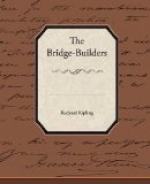in his arms and wept; the heart-breaking delays over
the filling of the contracts in England; the futile
correspondences hinting at great wealth of commissions
if one, only one, rather doubtful consignment were
passed; the war that followed the refusal; the careful,
polite obstruction at the other end that followed
the war, till young Hitchcock, putting one month’s
leave to another month, and borrowing ten days from
Findlayson, spent his poor little savings of a year
in a wild dash to London, and there, as his own tongue
asserted and the later consignments proved, put the
fear of God into a man so great that he feared only
Parliament and said so till Hitchcock wrought with
him across his own dinner table, and—he
feared the Kashi Bridge and all who spoke in its name.
Then there was the cholera that came in the night
to the village by the bridge works; and after the
cholera smote the small-pox. The fever they had
always with them. Hitchcock had been appointed
a magistrate of the third class with whipping powers,
for the better government of the community, and Findlayson
watched him wield his powers temperately, learning
what to overlook and what to look after. It was
a long, long reverie, and it covered storm, sudden
freshets, death in every manner and shape, violent
and awful rage against red tape half frenzying a mind
that knows it should be busy on other things; drought,
sanitation, finance; birth, wedding, burial, and riot
in the village of twenty warring castes; argument,
expostulation, persuasion, and the blank despair that
a man goes to bed upon, thankful that his rifle is
all in pieces in the gun-case. Behind everything
rose the black frame of the Kashi Bridge—plate
by plate, girder by girder, span by span—and
each pier of it recalled Hitchcock, the all-round
man, who had stood by his chief without failing from
the very first to this last.
So the bridge was two men’s work—unless
one counted Peroo, as Peroo certainly counted himself.
He was a Lascar, a Kharva from Bulsar, familiar with
every port between Rockhampton and London, who had
risen to the rank of serang on the British India boats,
but wearying of routine musters and clean clothes,
had thrown up the service and gone inland, where men
of his calibre were sure of employment. For his
knowledge of tackle and the handling of heavy weights,
Peroo was worth almost any price he might have chosen
to put upon his services; but custom decreed the wage
of the overhead-men, and Peroo was not within many
silver pieces of his proper value. Neither running
water nor extreme heights made him afraid; and, as
an ex-serang, he knew how to hold authority.
No piece of iron was so big or so badly placed that
Peroo could not devise a tackle to lift it—a
loose-ended, sagging arrangement, rigged with a scandalous
amount of talking, but perfectly equal to the work
in hand. It was Peroo who had saved the girder
of Number Seven pier from destruction when the new
wire-rope jammed in the eye of the crane, and the




